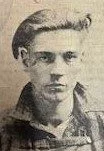
Appeal made on behalf of Louisiana man’s killer
Editor’s note: Following is the first part of a story series by contributing writer Brent Engel.
A mother’s impassioned plea once was all that stood between life and death for the murderer of a Louisiana man.
Twenty-two-year-old Arthur Barnes confessed to killing 35-year-old Carl Shumaker on Feb. 17, 1925.
Shumaker, a Louisiana native who lived at Eighth and Jackson with his wife and three children, was a mechanic at Stark Brothers. He was shot five times as he pursued Barnes and two accomplices, who had stolen a car belonging to nursery executive Clay Stark the previous night.
Barnes had lived in Quincy and worked at a mill there, but returned to Louisiana around the time of the killing. His mother, whose name was not printed by newspapers, sent a letter to Judge Edgar B. Woolfolk.
“I pray to God that his life may be spared so that he can have a chance to see his wrong and make himself right with God, and pray for the murderer to be saved,” she wrote.
The crime took place on a backroad three-and-a-half miles northwest of Elsberry, and the body was thrown into a nearby field. Stark offered a reward of what would today be more than $7,000 and vowed to help authorities make an arrest.
“The deceased was one of the nursery’s most trusted employees,” the Vandalia Press said.
A farmer discovered Shumaker’s body on Feb. 24. By then, the three suspects were being queried in Hannibal for a theft there three days earlier.
Investigators didn’t reveal details, but linked the robbery and the murder. They had several witnesses in the Shumaker case, and decided to use a little trickery.
“One of the three (suspects) was placed in a cell with two other prisoners not connected with the case, and each of the witnesses walked separately along the corridor and looked at the three men,” the Ralls County Record explained.
The witnesses identified Barnes and the two accomplices, 20-year-old Lonnie Clark of Louisiana and 18-year-old Clarence Baker of Quincy, another former Louisiana resident.
After 24 straight hours of questioning that ended at midnight Feb. 26, all admitted to being part of the murder. The Record reported each “declared that no undue pressure was used.”
Clark and Baker said they saw Barnes pull the trigger of the .45-caliber revolver. Clark, who worked at a Louisiana shoe factory, offered an account to a reporter.
He said the three tried to outrun a vehicle that was following them, but got stuck in mud. When Shumaker pulled to a stop about 75 feet behind, Barnes got out and told his companions he wanted “to see what that fellow wants.” Clark said Barnes began firing moments later.
“Shumaker fell without making a sound or cry of any kind,” Clark said.
Baker was defiant – calling himself “Bad Baker” and letting anyone who would listen know that he “never turned yellow” – but corroborated Clark’s story and said that after Barnes confessed “there was nothing for me to do but come across.” Barnes was asked if the murder bothered him.
“Hell, no,” he reportedly replied. “That don’t bother me none. No, I’m not sorry I killed him. I’m sorry I got in this jam, that’s all.”
An indignant Quincy Whig-Journal editorialist said Shumaker was killed “with as little formality as a man would pick his teeth” and bemoaned that life had become “remarkably cheap these days.”
Little did anyone know that the case would get more tangled, including revelations from more relatives.
Next time: “Be a good boy.”
